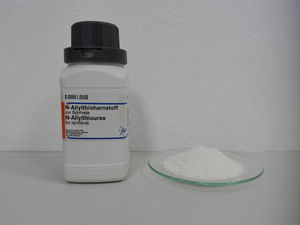N-Allylthiourea
From Sciencemadness Wiki

| |
| Names | |
|---|---|
| IUPAC name
Prop-2-enylthiourea
| |
| Other names
1-Allyl-2-thiourea
Allylthiourea n-Allylthiourea Rhodalline Thiosinamine | |
| Properties | |
| C4H8N2S | |
| Molar mass | 116.18 g/mol |
| Appearance | White solid |
| Odor | Slight garlic-like |
| Density | 1.11 g/cm3 (25 °C) |
| Melting point | 70–72 °C (158–162 °F; 343–345 K) |
| Boiling point | 191.3 °C (376.3 °F; 464.4 K) |
| 6.6 g/100 ml (20 °C) | |
| Solubility | Soluble in acetic acid, acetone, acetonitrile, aq. ammonia 25%, chloroform, DCM, ethanol, ethyl acetate, formaldehyde 37%, formic acid, HCl 37%, isopropanol, methanol, methyl acetate, pyridine Slightly soluble in diethyl ether Insoluble in benzene, heptane, hexane, toluene, xylene |
| Hazards | |
| Safety data sheet | Sigma-Aldrich |
| Lethal dose or concentration (LD, LC): | |
| LD50 (Median dose)
|
200 mg/kg (rat, oral) |
| Related compounds | |
| Related compounds
|
Thiourea |
| Except where otherwise noted, data are given for materials in their standard state (at 25 °C [77 °F], 100 kPa). | |
| Infobox references | |
N-Allylthiourea is an organic chemical compound with the formula C4H8N2S.
Contents
[hide]Properties
Chemical
N-Allylthiourea decomposes when heated above its melting point to release sulfur oxides.
Physical
N-Allylthiourea is a white crystalline solid, slightly soluble in water but more soluble in most common solvents, except for hydrocarbons. It has a weak garlic-like odor.
Availability
N-Allylthiourea is sold by chemical suppliers.
Preparation
To be added
Projects
- Nitrification inhibitor
- Chelating agent
- Used in medicine to minimize scar tissue
Handling
Safety
N-Allylthiourea is toxic if ingested. Proper protection must be worn when handling this compound.
Storage
Should be kept in closed bottles, at temperatures below 30 °C.
Disposal
Cane be neutralized with an oxidizing solution, like aqua regia, chromic acid, Fenton's reagent or piranha solution, neutralized, diluted then poured down the drain.